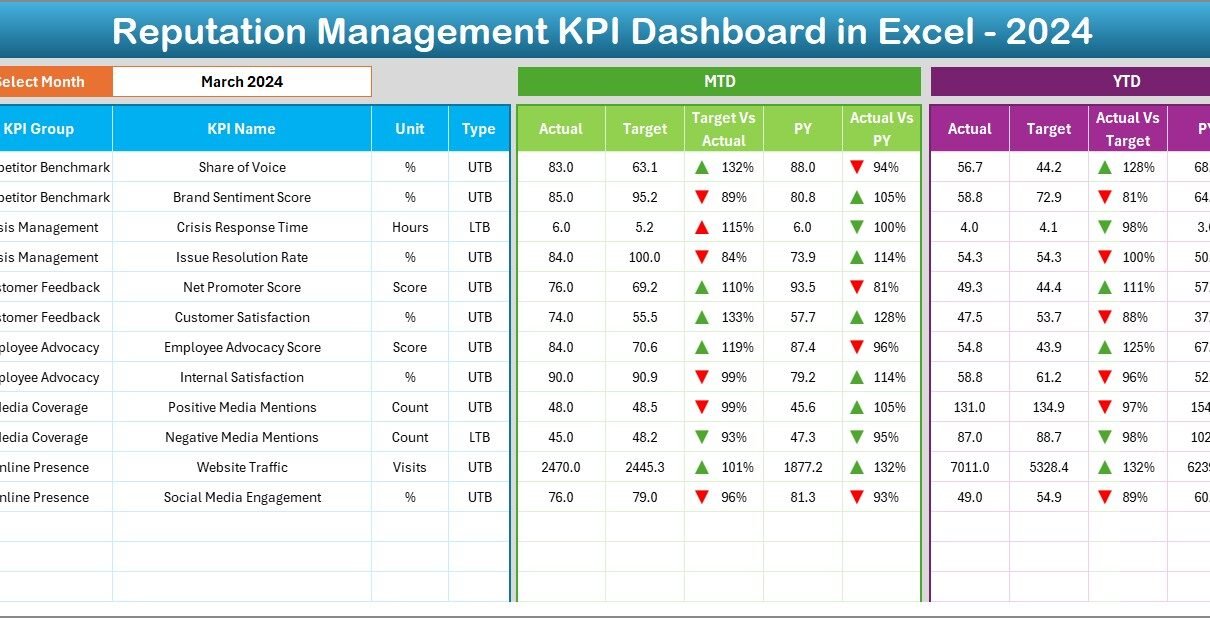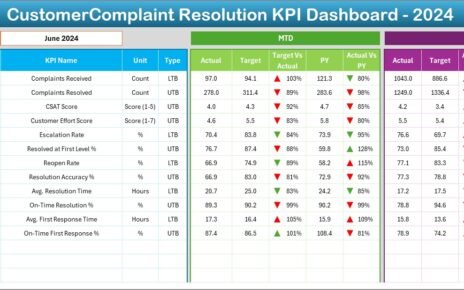In today’s digital-first world, a brand’s reputation is one of its most valuable assets. Customers research online reviews, employees share workplace experiences on social platforms, and stakeholders expect transparency. With so much public visibility, organizations must track, measure, and manage their reputation with precision.
This is where a Reputation Management KPI Dashboard in Excel becomes a game-changer. Unlike scattered reports or manual monitoring, this dashboard centralizes data into one structured view. It not only highlights the brand’s performance but also shows areas that require immediate attention.
In this article, we will explore the structure of the Reputation Management KPI Dashboard in Excel, its key features, benefits, best practices, and how you can implement it to strengthen your brand reputation.
Click to buy Reputation Management KPI Dashboard in Excel
What Is a Reputation Management KPI Dashboard in Excel?
A Reputation Management KPI Dashboard in Excel is a digital tool that consolidates all reputation-related Key Performance Indicators (KPIs) into one place. It uses Excel’s charts, slicers, conditional formatting, and pivot tables to transform raw data into actionable insights.
Instead of juggling multiple spreadsheets or relying on external tools, you can track:
- Customer reviews and ratings
- Brand mentions across platforms
- Sentiment trends (positive, negative, neutral)
- Employee satisfaction and engagement
- Service quality metrics
- Complaint resolution times
- Media or PR coverage
This structured approach empowers leaders, marketers, and customer service managers to protect and enhance the organization’s reputation.
Key Features of the Reputation Management KPI Dashboard
This ready-to-use Excel dashboard template includes seven structured worksheets. Each plays a crucial role in gathering, analyzing, and presenting data. Let’s explore them one by one.
Home Sheet – The Index Page
The Home sheet works like an index page. It includes six navigation buttons that allow users to jump directly to different worksheet tabs. This ensures a smooth user experience and eliminates the need to scroll through large workbooks.
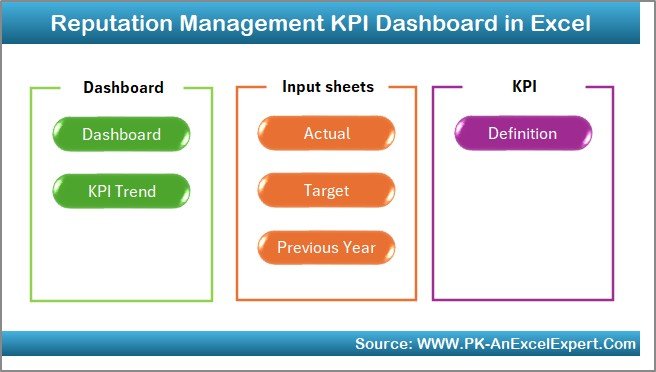
Click to buy Reputation Management KPI Dashboard in Excel
Dashboard Sheet – The Central View
The Dashboard sheet is the heart of this tool.
- At the top, a month selector (cell D3) allows users to choose a reporting month from a dropdown. The entire dashboard updates dynamically based on this selection.
- It displays MTD (Month-to-Date) Actual, Target, and Previous Year values along with variance analysis.
- Conditional formatting adds green up arrows and red down arrows to quickly highlight performance against targets.
- The dashboard also includes YTD (Year-to-Date) Actual, Target, and Previous Year data for a long-term perspective.
This ensures stakeholders get both short-term progress and long-term trends at a glance.
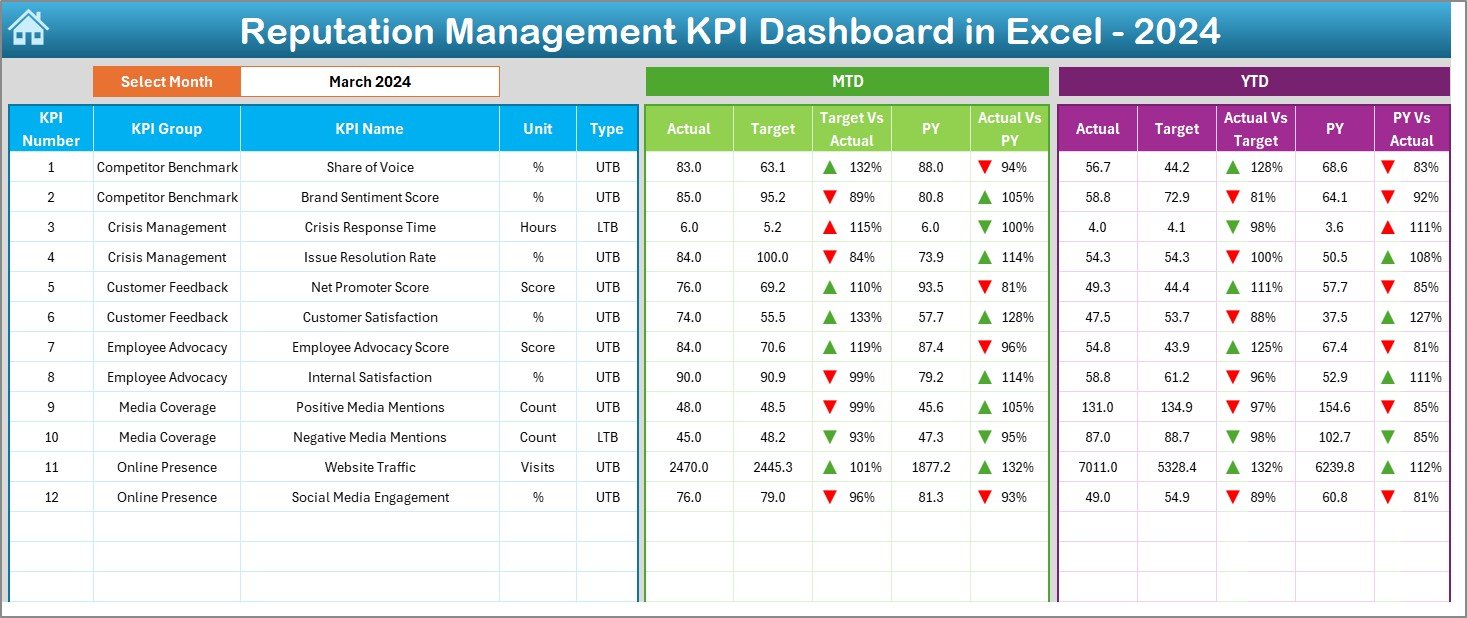
Click to buy Reputation Management KPI Dashboard in Excel
KPI Trend Sheet – Tracking Performance Over Time
The KPI Trend sheet gives users the ability to deep dive into specific KPIs.
- A dropdown in cell C3 allows you to select any KPI.
- Once selected, the sheet displays its KPI Group, Unit, Type (LTB – Lower the Better, UTB – Upper the Better), Formula, and Definition.
- Below, trend charts showcase MTD and YTD values for Actual, Target, and Previous Year numbers.
This feature makes it easy to track whether performance is improving or declining over time.
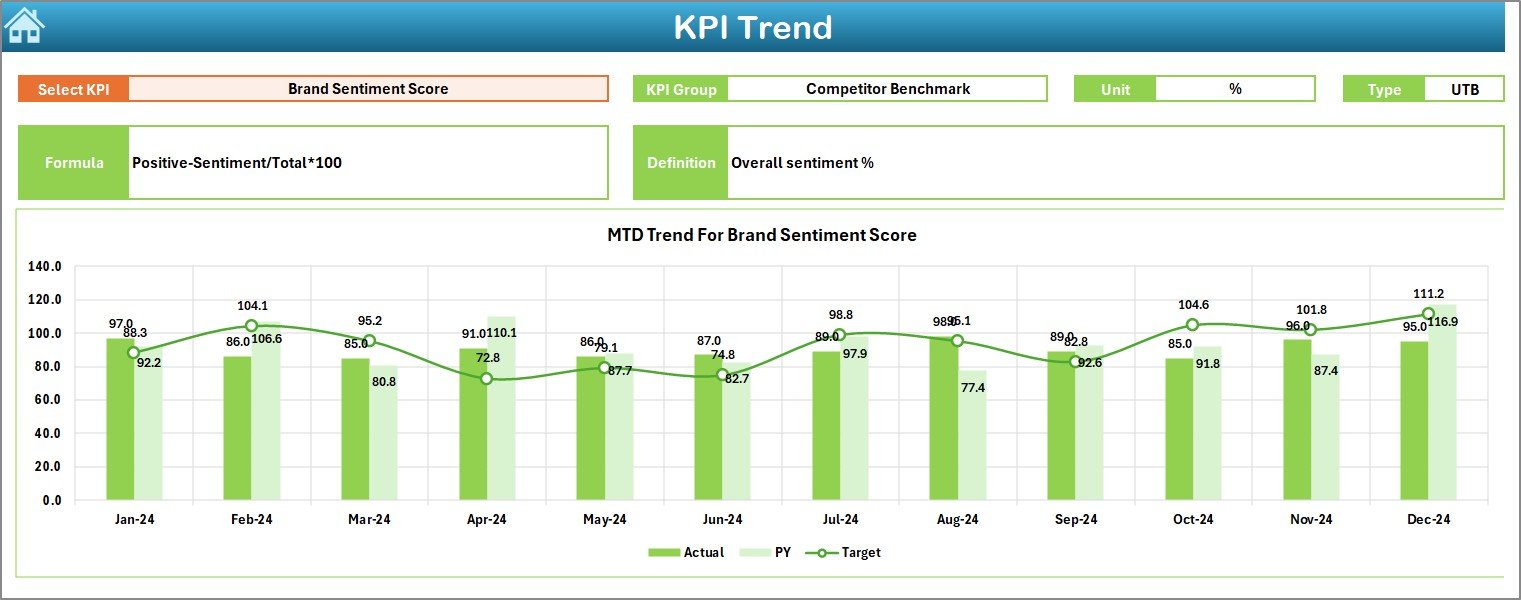
Click to buy Reputation Management KPI Dashboard in Excel
Actual Numbers Input Sheet – Entering Real Data
This sheet is where you input monthly actual data.
- Users can select the first month of the year in cell E1.
- Once set, MTD and YTD values can be entered month by month.
- These numbers automatically flow into the dashboard and trend sheets.
It ensures the dashboard reflects real-world performance without manual recalculations.

Click to buy Reputation Management KPI Dashboard in Excel
Target Sheet – Defining Goals
The Target sheet is used to set monthly targets for each KPI.
- Both MTD and YTD targets can be entered.
- These targets serve as benchmarks against which actual numbers are compared.
Clear targets help ensure that the reputation strategy is aligned with organizational objectives.

Click to buy Reputation Management KPI Dashboard in Excel
Previous Year Numbers – Historical Data
This sheet captures previous year data for all KPIs.
- Comparing current year with previous year provides context.
- It helps in measuring growth, decline, and year-over-year trends.

Click to buy Reputation Management KPI Dashboard in Excel
KPI Definition Sheet – Clear Understanding
The KPI Definition sheet is like a reference manual within the dashboard.
- It includes KPI Name, KPI Group, Unit, Formula, and Definition.
- By documenting KPIs, everyone in the organization understands what each metric means.
This transparency prevents confusion and ensures data consistency.

Click to buy Reputation Management KPI Dashboard in Excel
Why Do You Need a Reputation Management KPI Dashboard?
Managing a brand’s reputation involves monitoring multiple touchpoints—customers, employees, media, and competitors. Without a structured system, it’s easy to miss signals that could harm brand credibility.
Here’s why this dashboard is essential:
- Centralized Data: Brings all KPIs into one place.
- Faster Insights: Reduces time spent on manual reporting.
- Real-Time Monitoring: Ensures proactive management.
- Decision Support: Helps leaders make data-backed decisions.
- Benchmarking: Tracks performance against targets and past data.
Advantages of Reputation Management KPI Dashboard in Excel
Using this dashboard offers multiple benefits for organizations of all sizes.
- Improved Decision-Making: Real-time insights guide better strategies.
- Early Issue Detection: Quickly highlights drops in satisfaction or spikes in negative sentiment.
- Employee Engagement: Tracks internal reputation alongside external perception.
- Cost-Effective: Built in Excel, so no extra software is required.
- Scalable: Can be expanded with more KPIs as needed.
- User-Friendly: No need for advanced technical skills.
Best Practices for Using the Reputation Management KPI Dashboard
Click to buy Reputation Management KPI Dashboard in Excel
To get the most value from this tool, follow these best practices:
- Define KPIs Clearly: Ensure each KPI has a clear purpose and definition.
- Update Data Regularly: Keep actual numbers updated at least monthly.
- Compare with Targets & Benchmarks: Always analyze gaps between actual and target.
- Use Conditional Formatting Wisely: Visual signals should be simple and clear.
- Engage Stakeholders: Share dashboard reports with leadership, marketing, and HR.
- Review Trends: Don’t just look at one month—analyze long-term patterns.
Who Can Benefit from This Dashboard?
- Marketing Teams: Monitor brand image and customer sentiment.
- Customer Service: Track complaint handling and resolution speed.
- Human Resources: Analyze employee satisfaction and retention.
- Public Relations (PR): Measure media coverage and public response.
- Executives: Make strategic decisions to strengthen brand reputation.
Conclusion
Click to buy Reputation Management KPI Dashboard in Excel
A strong reputation drives customer trust, employee loyalty, and long-term business growth. The Reputation Management KPI Dashboard in Excel provides organizations with a practical, cost-effective way to track and improve their reputation.
By centralizing KPIs, enabling trend analysis, and simplifying reporting, this dashboard ensures that decision-makers can act quickly and strategically. Whether you are a small business or a large enterprise, implementing this tool can help you protect and enhance your brand image.
Frequently Asked Questions (FAQs)
- What KPIs should I track in a Reputation Management Dashboard?
You should track customer satisfaction, net promoter score, online review ratings, employee engagement, complaint resolution time, sentiment analysis, and media mentions.
- Can I customize the dashboard for my organization?
Yes. Since it is built in Excel, you can easily add new KPIs, adjust formulas, or redesign charts.
- How often should I update the dashboard?
At minimum, update it monthly. However, for businesses with high public exposure, weekly updates may be more effective.
- Is Excel powerful enough for reputation management?
Yes. For small and mid-sized businesses, Excel provides all the tools needed. For larger enterprises, Excel can complement specialized software.
- Who should maintain the dashboard?
Ideally, a cross-functional team including marketing, customer service, and HR should maintain it to ensure holistic reputation tracking
Visit our YouTube channel to learn step-by-step video tutorials
Watch the step-by-step video tutorial:
Click to buy Reputation Management KPI Dashboard in Excel
